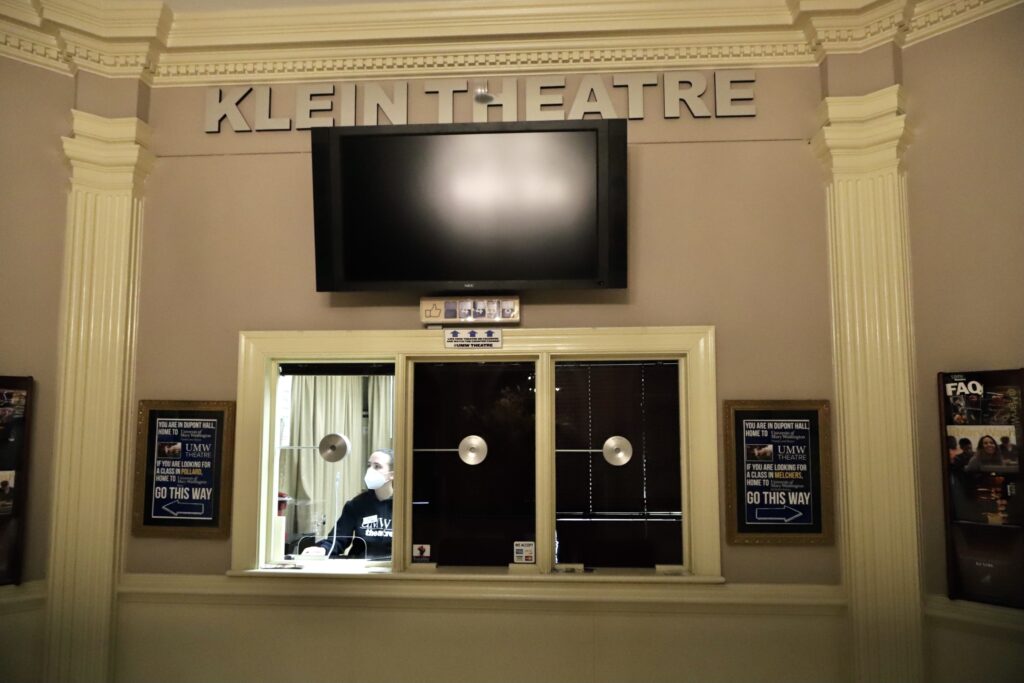Theatre department postpones shows to March amid COVID-19 surge
3 min read
The ticket booth at the Klein Theatre. | Emily Warren/The Weekly Ringer
by DANIEL CHILDERS
Staff Writer
Due to the current COVID surge, the theater department at UMW has altered its schedule with postponement and rescheduling of shows. Now starting March 10, “Julius Caesar” will open with a limited run, and “The 25th Annual Putnam County Spelling Bee” will now open on March 30, according to a press release from UMW Theatre. A few more productions are set to take place such as “Significant Other,” “White” and “Circle Mirror Transformation.” These will be announced at a later date as COVID conditions allow.
“I think we just need to ride it out, together,” said junior theatre major Matthew Monaghan.
Reduced gatherings and rehearsals have severely altered the plans of students in the theatre department.
“For me personally, my dad is immunocompromised and we have to be super cautious at home,” said Monaghan. “I love UMW, but it’s overwhelmingly been a challenge to keep up with mandates and limited gatherings that are ever-evolving.”
The direct contact and sometimes close interactions, including touching, conflict with COVID standards and regulations. This causes challenges for productions and normal rehearsals, leading to delays and further challenges. Despite all of this, the theatre department has assured “Julius Caesar” and other performances will go on.
For faculty, maintaining a safe and productive learning environment remains a priority. Some professors have expressed their views on the pandemic and how different the landscape is now.
Jon K. Reynolds, director of marketing and audience services for the UMW Theatre, said the experience for college students is of the most priority. “We are certainly interested in re-engaging with the community as a whole, but there are steps to be taken to do that in the correct way,” he said.
UMW Theatre has done virtual shows in the past, but Reynolds hopes to bring back the experience of live theatre.
“We did a virtual production in the spring of 2020 when our production of ‘Much Ado About Nothing’ was sidelined by the pandemic,” he said. “It was very successful, and we have no regrets about having done it. However, we recognize that theatre is a live art form meant to be performed in person, in a shared space with other audience members and the performers.
We took an approach last year to focus on our students’ experience and providing quality educational opportunities to them for the 2020-2021 academic year, and then this year, we decided it was time to begin creating experiential opportunities again for our students and provide live performances to the community because that is what we need to get back to.”
Faculty members in other departments are facing similar issues. James Kuykendall, chair for the music department at UMW, explained that music majors and students have to battle another challenge: instruments that require the mouth to operate such as clarinets or trombones. This has caused issues since the music department was denied a mask exemption in Sept. 2021, as reported in The Weekly Ringer.
“In 2020-21, the choral ensembles existed only over Zoom; the orchestra performances were synched-up videos,” said Kuykendall. “‘Ensemble’ means ‘together,’ and Zoom is not a way to build a musical community. There are ways of making it work, but they work against the very things that draw people into making music together in the first place.”
The performing arts tinkered with Zoom for some of 2020, and, according to the department heads, it was surprisingly successful. After restrictions eased up, the theatre department began the switch back to live shows, but now with another COVID surge, they’re hoping not to be forced back to Zoom in 2022.
Performing arts remain functional with new schedules. Amidst the challenges and changes, at least four performances are in the plans for this spring semester. While the theatre department navigates their respective endeavors, the music department has seen no delays or issues in the plans for their shows.
“It certainly seems that the university is being responsive to the fact that theatre students and all our performing artists gain the greatest experience from being with an audience, sharing space,” said Reynolds. “It appears that the same goes for athletes who need to share space with other schools and with spectators. This year, all was brought back into the realm of possibility for us where last year, it wasn’t conceivable.”
Eli Osborne contributed to reporting for this article.


